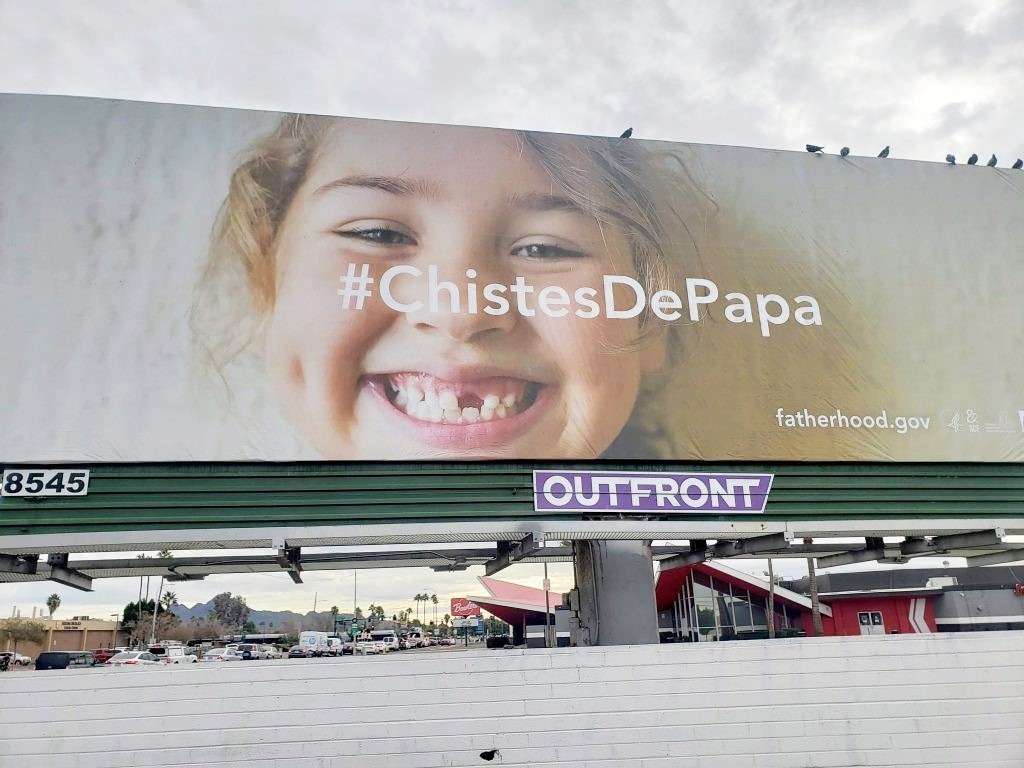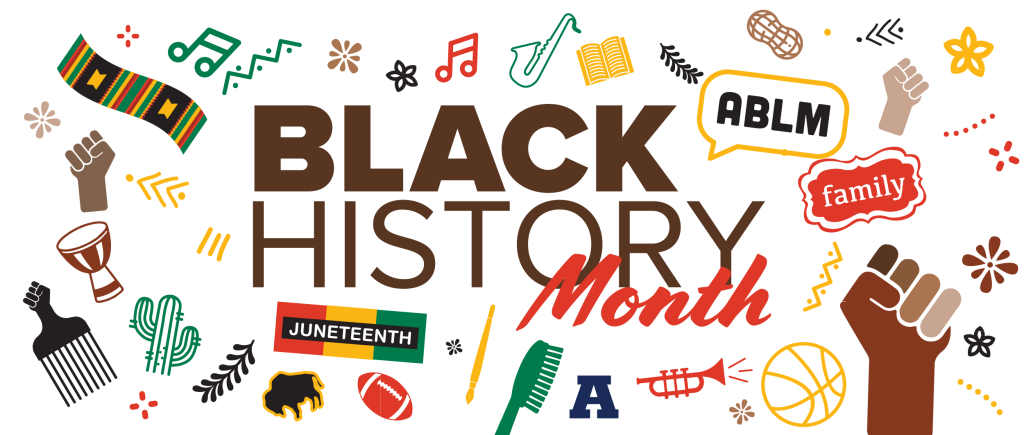#ChistesDePapa? What are they Selling?
If comedian Jerry Seinfeld filmed an episode of Comedians in Cars in west Phoenix and happened to drive by the corner of 19th Avenue and Bethany Home Road, he might not understand what the giant billboard with the Spanish hashtag ‘#ChistesDePapa’ is about. Jerry does not speak Spanish, so why would he know that the billboard is meant to illustrate the importance of fatherhood through the Spanish translation of ‘dad jokes’?
However, Jerry wouldn’t be alone in his incomprehension, as though this colorful Phoenix neighborhood is over 55% Hispanic[1], the Spanish-dominant residents living there don’t understand the relevance of the hashtag either.

Digging Deeper
When I first drove past this billboard near my home in central Phoenix, I had to pull over to make sure that I had read it correctly. Sure enough, it was simply the hashtag ‘#ChistesDePapa’, no more, no less. No call to action, no message. After staring at it for a few minutes, my 10+ years of Hispanic advertising experience told me that this work must have been the result of either:
- A: It was a translation created or approved by Hector from Accounting, which is the oft-used tactic of delegating Hispanic marketing work to an internal employee who speaks Spanish. If this was not the case, then surely it was a result of…
- B: The agency that created it was a traditional advertising agency, one without expertise in modern digital marketing tactics including social media. I believe that Fatherhood (.gov), which is the government agency that created this campaign, decided to include a hashtag, because as we know; all the cool kids are using hashtags. The problem with this, as Neil James documents in his 2015 article in DigiDay, is that just like when you were a kid and your parents tried to bond with you by listening to your music, copying your fashion, or using your slang, the effort typically falls on its face.
Tale of the Hashtag
For those who don’t open Instagram several times per day for work (guilty!), the main issue with the Spanish campaign is the lack of usage of the expression, ‘chistes de papa‘ which directly translates to ‘dad jokes’ in English.
There are many ways to measure the utilization of an expression. Since hashtags are predominant on Instagram, the following shows usage data of the following three hashtags related to the Fatherhood (.gov) campaign.

- #ChistesDePapa – 18 lifetime posts as of 4/17/19. Most recent is nearly 60 days old.
- #DadJokesRule – 2,410 lifetime posts as of 4/17/19. Nine posts on 4/17/19 alone.
- #DadJokes – 442,630 lifetime posts as of 4/17/19. Approximately 360 posts on 4/17/19 alone.
Yes, you read the graph correctly, as of the time of this writing, there are less than 20 posts on Instagram using the hashtag #ChistesDePapa. We can compare this hashtag apples to apples to the English language hashtag equivalent, #DadJokes, which has over 440,000 posts. To be noted, the English language marketing campaign for Fatherhood.gov uses #DadJokesRule, which has about 2,400 mentions on Instagram. The government agency’s usage of a separate hashtag capitalizes on the fact that in American English, ‘dad jokes’ are a common subject of amusement. The agency was smart in using a similar but separate hashtag for their marketing campaign. By using #DadJokesRule they could truly own this unique hashtag that captures the positive sentiment of ‘dad jokes’ without their message being washed out by the hundreds of people that post their own images using #DadJokes each day.
There was no issue in over-utilization of ‘dad jokes’ in Spanish as even the most common hashtag that translates to ‘dad jokes’, #ChistesDePapa, is virtually unused. The point is that ‘dad jokes’ is a common topic of amusement in English, but simply does not resonate when translated to Spanish.
What do Hispanic Dads and Google Think about #ChistesDePapa?
Curious about how others thought of the hashtag, I asked several Spanish-speaking dads I know for their opinion on this topic. Their reactions were similar in that their first expression was the cringe face as if to say, “Oh no. Another one of those ad campaigns.”
The fathers understood the meaning of ‘dad jokes’, but all felt that the topic of dad jokes is a current cultural theme, but not one that resonates with Spanish speakers. The term ‘Dad Jokes’ was first seen on the internet in 2003, but did not rise to widespread utilization until June of 2013.[2] Today, there are over 7 million results if you search on Google for “dad jokes”, which is over 25 times the volume of results you get from Google from the Spanish equivalent query of “chistes de papa”.
A Great Discussion with Ad Agency Campbell Ewald
Interested in the strategy behind the Fatherhood (.gov) Spanish language campaign, I reached out to the government organization directly and was able to obtain helpful information regarding the direction of the campaign. The Ad Council and their advertising agency Campbell Ewald helped me understand the strategy behind the Fatherhood (.gov) campaign, sharing information via email, and granting my team a 30-minute interview to discuss their strategy. Through this I learned the following:
English Dad Jokes Rule Campaign
- The focus of Fatherhood (.gov) campaigns is the Universal Dad. ‘Dad Jokes’ as a topic were chosen as they are felt to be agnostic of race, income, or social status.
- From their research, dad jokes are relevant to all dads and are a free resource that doesn’t take much time. Best of all, dads already tell dad jokes.
- The Dad Jokes Rule campaign celebrates dads, as opposed to focusing on where dads are failing. It is used as a reminder that it takes a small moment to make a big impact with children.
Spanish Dad Jokes Rule Campaign
- For the Spanish campaign, there was more effort placed on the written jokes placed on the Spanish Fatherhood (.gov) website. The agency performed transcreations on the English joke content, as opposed to straight translations. Transcreation is used when simply translating content is not adequate. Transcreation requires reviewing English content and rewriting it to make sense for a Spanish reader. Marketing assets for this campaign included TV, online video, radio, Out of Home (OOH), print and digital banners.
- The campaign was considered a success. The agency reported that the 30 second Spanish-language TV spot received 55% more support (meaning that Spanish media selected it for placement) than any other of their assets 6 months after launch, which is how donated media is measured.
- Fatherhood (.gov) also asked their models/actors to bring jokes to the photoshoots so the jokes would resonate more with the Hispanic audience.
- The hashtag, #ChistesDePapa, was used as the punchline in the campaign. It was intentionally brief, to fit the space of the billboard.
Questions for How to Strategize a Hispanic Marketing Campaign
I believe that the Hispanic marketing egg in the case of this campaign was laid by the Hispanic agency that approved of the selection of #ChistesDePapa. Unfortunately, the agency was not able to obtain answers for the inquiries I posed regarding hashtag selection, but these questions will be useful in future Hispanic marketing campaigns for any government organization. The queries left unanswered are below:
- How was the Spanish hashtag #ChistesDePapa selected for this campaign?
- Is the concept of ‘chistes de papa’ a straight translation from the English expression ‘dad jokes’? Or was there research that shows that dad jokes are a popular topic for Spanish-dominant Hispanics, similar to its popularity/awareness among the general U.S. audience?
- Were there other topics or Spanish hashtag options that were suggested as a transcreation for ‘dad jokes’? Were there other transcreations that considered verbiage that Hispanics more commonly use in everyday conversation?
Good Intentions of #ChistesDePapa
I don’t want it to be lost that I do truly believe that it is beneficial that these messages about the importance of fathering be displayed to the public to hopefully make an impression on Spanish-speaking fathers. However, I strongly believe that the message could be substantially more powerful if the correct resources are put in place to create a message that will resonate naturally with the Spanish language consumer on all marketing assets.
What’s Next for #ChistesDePapa?
The Ad Council does often reuse marketing material for several years, so it’s likely we will see these assets and billboards nationally for some time to come. In the interview, it was mentioned that the hashtag #ChistesDePapa was the punchline of the campaign. They selected to use this hashtag rather than considering a short message that would be more understandable for the target audience. I feel that while the campaign was significant in its attempts to reach all types of Hispanic consumers, that arguably the most important piece of the campaign, the punchline, was botched. And since it’s likely that the Spanish Dad Jokes Rule campaign is not going anywhere, hopefully, the next time a comedian, or anyone for that matter, drives past one of their Spanish billboards, that they’ll land their punchline.
—————————————-
About Fatherhood (.gov)
The National Responsible Fatherhood Clearinghouse is an Office of Family Assistance (OFA) funded national resource for fathers, practitioners, programs/Federal grantees, states, and the public at-large who are serving or interested in supporting strong fathers and families.
To learn more about Fatherhood (.gov), please use the following links:
English website: https://www.fatherhood.gov/
Spanish website: https://www.fatherhood.gov/espanol
Dad Jokes Page: https://www.fatherhood.gov/dad-jokes
Print Assets: https://www.fatherhood.gov/multimedia/print
Spanish YouTube Video: https://www.youtube.com/watch?v=EMHnXrfBWWE&feature=youtu.be
References
[1] Census Tract 1073: http://www.nytimes.com/projects/census/2010/map.html
[2] https://www.sporcle.com/blog/2018/06/the-history-of-dad-jokes/




